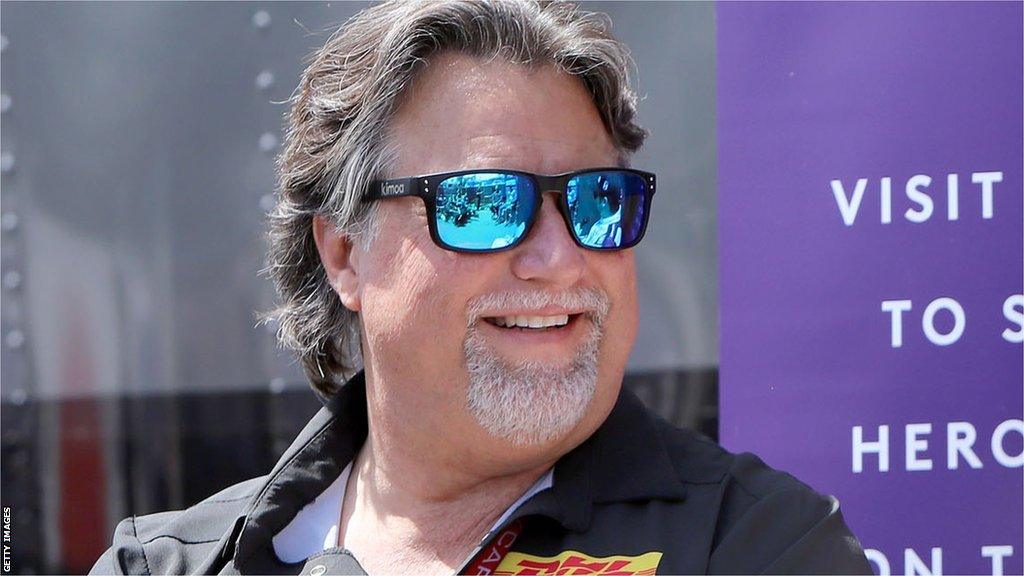General Motors registers as Formula 1 power-unit supplier for 2028
- Published

Andretti Global chairman Michael Andretti (pictured) said in January the Andretti Cadillac team are "well suited to be a new team for F1 and can bring value to the series"
American car giant General Motors has registered as a Formula 1 power-unit supplier from the 2028 season.
GM's Cadillac brand is part of an ongoing bid by the Andretti team to enter the sport which has yet to be formally approved.
A statement said GM had already started work on preparing its engine for F1's new engine regulations.
GM president Mark Reuss said the company was "confident" of developing a "successful power-unit for the series".
Reuss also highlighted GM's "deep engineering and racing expertise".
These rules, to be introduced in 2026, combine hybrid engines with a greater proportion of their power output provided by electricity than now with synthetic, fully-sustainable fuels.
The statement added: "Engineering a F1 power unit will advance GM's expertise in areas including electrification, hybrid technology, sustainable fuels, high efficiency internal combustion engines, advanced controls and software systems."
Last month, Andretti's entry was approved by F1's governing body the FIA.
But it still has to clear the hurdle of approval by F1's commercial rights holder Liberty Media, which has so far been lukewarm on Andretti's potential entry.
Initially, Andretti and GM's plan was to badge a Renault engine with the Cadillac brand for its entry in 2025.
But it has emerged in recent weeks that Andretti no longer has a contract with Renault.
However, F1's rules dictate that any team lacking an engine has to be supplied by one of the existing power-unit manufacturers.
The news that GM has plans to build its own engine, to be used within a couple of years of its prospective entry, will increase the pressure on F1 to accept Andretti-GM.
F1 president Stefano Domenicali has said there are "a lot of dimensions to consider and we don't have to overreact because someone is pushing the system".
The 10 existing teams are opposed to Andretti entering F1.
F1's governing documents, often referred to as the Concorde Agreement, allow for up to 12 teams to take part in the sport.
They mandate a $200m (£160m) anti-dilution fee to be split between the existing teams to compensate them for the loss of prize money caused by their portion of F1's funds being split 11 ways rather than 10.
A number of teams have suggested that $200m is too low a figure given the apparent rise in value of the teams as a result of the sport's increase in popularity in recent years.
Estimates put the value of leading teams in the region of $1bn (£820m).
There is talk of the anti-dilution fee being increased when the new Concorde Agreement comes into force in 2026.
Privately, F1 has been opposed to the idea of admitting a new team, but in recent weeks the feeling within the sport is that they might ultimately have to accept Andretti.
On the surface, an entry from a team that has such strong ties with the American market should be positive for F1.
Mario Andretti, the father of Andretti Global boss Michael Andretti, is a motorsport legend and the 1978 F1 world champion. Michael Andretti is one of the most successful IndyCar drivers in history.
Combining the Andretti name with the power of the Cadillac brand, perhaps the most famous luxury car name in America, would on the face of it appear to be a way to raise the profile of the sport in one of its most important markets.
Reuss said the decision to build its own engine would "position Andretti Cadillac as a true works team".
He added: "We will run with the very best, at the highest levels, with passion and integrity that will help elevate the sport for race fans around the world."
'Believe it ... that loving yourself is the answer': Actor and talk show host Jada Pinkett Smith on the advice she would give her younger self
Exposing organised crime: Follow a specialist police unit over an extraordinary two-year operation